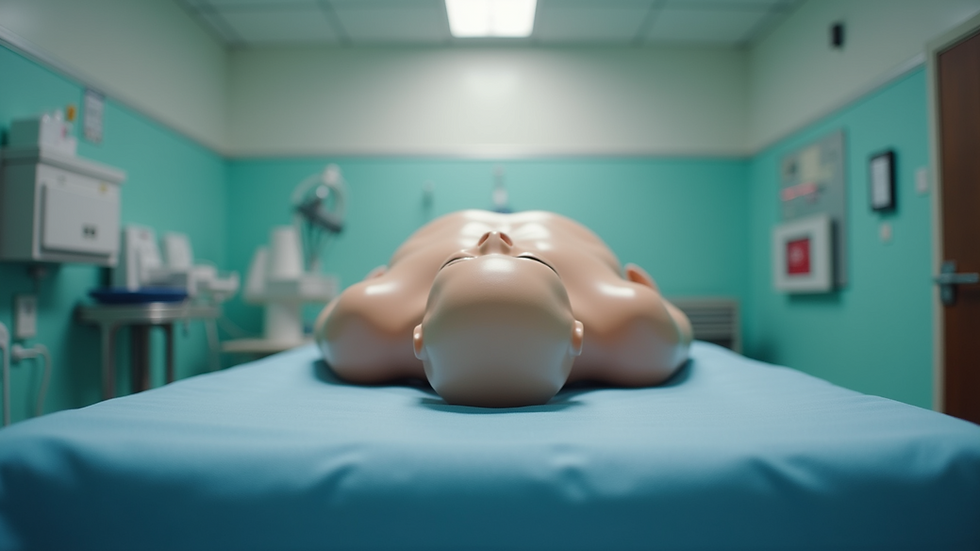Understanding the Value of Emergency Preparedness Education
- Anthony Dixon
- Nov 4, 2025
- 4 min read
When emergencies strike, every second counts. Knowing what to do can make a huge difference in saving lives and reducing harm. That’s why I believe in the power of emergency preparedness education. It equips us with the knowledge and skills to act quickly and confidently when faced with unexpected situations. Whether it’s a medical emergency, natural disaster, or accident, being prepared helps us protect ourselves and those around us.
In this post, I’ll share why emergency preparedness education is so valuable, especially for healthcare professionals and community members who want to be ready to help. I’ll also offer practical tips on how to get started and stay prepared. Let’s dive in!
Why Preparedness Education Benefits Everyone
Preparedness education benefits individuals and communities alike. It builds confidence and reduces panic during emergencies. When you know what to do, you can respond calmly and effectively. This is especially important for healthcare professionals who often serve as first responders in critical moments.
Here are some key benefits:
Improved response time: Training helps you act fast, which can save lives.
Reduced injuries and fatalities: Knowing first aid and CPR can prevent complications.
Increased community resilience: Prepared individuals support each other and recover faster.
Empowerment: You feel more in control and less anxious about emergencies.
Better decision-making: Education teaches you how to assess situations and prioritize actions.
For example, learning CPR can mean the difference between life and death for someone experiencing cardiac arrest. Knowing how to stop bleeding or treat burns can prevent infections and further damage. These skills are invaluable in both professional and everyday settings.

How to Start Your Emergency Preparedness Journey
Getting started with emergency preparedness education is easier than you might think. Here’s a simple plan to help you build your skills and confidence:
Find a reputable training provider: Look for local organizations or online courses that offer certified training in CPR, first aid, and other emergency skills.
Take a course: Enroll in a class that fits your schedule. Many courses combine theory with hands-on practice.
Practice regularly: Skills like CPR need refreshing. Practice on mannequins or with peers to stay sharp.
Create an emergency kit: Assemble supplies like bandages, gloves, a flashlight, and water. Keep it accessible at home and work.
Make a plan: Know your emergency contacts, evacuation routes, and meeting points.
Stay informed: Follow local news and weather alerts to anticipate potential emergencies.
By following these steps, you’ll be better prepared to handle a variety of situations. Remember, preparedness is a continuous process, not a one-time event.
Practical Tips for Healthcare Professionals and Community Members
Whether you’re a healthcare professional or a community member, these tips will help you maximize the benefits of your training:
Stay calm and focused: Your composure can reassure others and improve outcomes.
Communicate clearly: Use simple language and give clear instructions.
Use protective gear: Always wear gloves and masks when providing first aid to reduce infection risk.
Know your limits: Provide care within your training and call for professional help when needed.
Encourage others to learn: Share your knowledge and motivate friends and family to get trained.
Keep your certifications current: Many courses require renewal every two years.
By applying these tips, you’ll be a reliable resource in emergencies and help build a safer community.

The Role of Community Training in Lawrenceville
In Lawrenceville, building a community of prepared individuals is a priority. Heart Beats CPR Training is dedicated to making sure more people feel ready and confident to handle emergencies. They offer accessible courses tailored to the needs of healthcare professionals and community members alike.
Community training programs help:
Increase the number of trained responders in public spaces.
Promote awareness of common emergencies and how to respond.
Provide essential first aid supplies and resources.
Foster a culture of safety and readiness.
By participating in local training, you contribute to a stronger, more resilient Lawrenceville. It’s a great way to connect with neighbors and support each other in times of need.
Staying Ready: Beyond the Basics
Emergency preparedness education is just the beginning. Staying ready means continuously updating your knowledge and adapting to new challenges. Here are some ways to keep your skills fresh and your mindset prepared:
Attend refresher courses: New techniques and guidelines emerge regularly.
Join community drills: Practice scenarios with others to improve teamwork.
Use technology: Apps and online resources can provide quick guidance during emergencies.
Educate your family: Teach children and loved ones basic safety and first aid.
Prepare for specific risks: Tailor your plan for local hazards like storms or fires.
Remember, preparedness is a journey. The more you invest in learning and practicing, the more confident and capable you’ll become.
For those interested in deepening their knowledge, I highly recommend exploring emergency preparedness education resources. They offer valuable insights and training opportunities that can make a real difference.
By embracing emergency preparedness education benefits, you empower yourself and your community. Together, we can create a safer environment where everyone knows how to respond when it matters most. Start your journey today and be the difference in an emergency.



Comments